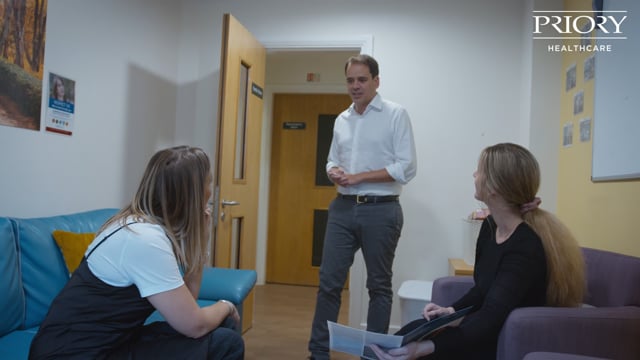About this location
Located in High Wycombe, near to the towns of Marlow and Maidenhead, Chiltern Park House supports individuals with an eating disorder, who are ready to step out of a specialist eating disorder unit (SEDU) but may need further support prior to community discharge. We provide a safe and structured residential environment which acts as an alternative to hospital admission.
Services at a glance
Click here to enable this content
Services
Our transitional, rehabilitation eating disorder service provides care for people who are no longer suited to a restricted hospital environment, but require an element of stabilisation before returning to the community.
Breakdown
- 14-beds for adult males and females
Conditions treated
We are able to support people with a primary diagnosis of an eating disorder. These include:
- Anorexia nervosa
- Bulimia nervosa
- Other specified feeding or eating disorders (OSFED)
We are also able to support co-occurring mental health conditions, and our programme is also neurodiversity inclusive. We recognise and support neurodiverse residents, adapting therapy and routines to meet individual needs.
Treatment approaches
We provide a rehabilitative model focused on supporting residents to develop new skills as well as build on existing strengths. Our aim is to give residents the tools to build resilience for community-based living, while offering opportunity to practice real life experiences. We endeavour to improve quality of life and a sense of identity outside of a hospital environment – supporting residents to navigate a world without an eating disorder.
At Chiltern Park House, we offer an individualised, person-centred approach to all of our residents. The philosophy of our programme is grounded in collaboration and mutual respect. We cultivate this atmosphere by listening to the needs of our residents and adopting a flexible approach that accommodates individual requirements whenever possible. At the same time, we maintain clear and consistent boundaries, with transparent rationale shared with residents, families, and staff. We believe this balance creates a safe and trusting environment, enabling residents to explore their feelings fully, confident that they will be met with empathy and understanding.
We discuss the most appropriate pathway of care, and treatment needs will be identified and discussed with the resident, within a timely manner. The most appropriate treatment pathway will be identified and discussed with the resident within a timely manner.
- CBT
- DBT
- Acceptance therapy
- Art therapy
- Family therapy
- MANTRA
- Informed schema-focused therapy
- Graded exposure therapy
Our team
Our highly experienced, multidisciplinary team consists of:
- Clinical lead (consultant psychiatrist/specialist ED clinician)
- Specialist ED nurses
- Support workers
- Dietitian
- Occupational therapist (OT)
- Consultant Clinical Psychologist
Therapeutic and community-based activities
Our therapeutic approaches are designed to support recovery in a safe and supportive environment. Our team works closely with each resident to tailor care to their individual needs.
Based on needs, the following range of therapies may be offered:
- Individual therapy – evidence-based approaches such as cognitive behaviour therapy (CBT), dialectical behavioural therapy (DBT), compassion-focused therapy (CFT), and schema-focused therapy (SFT), tailored to each resident’s unique needs. Our person-centred approach helps residents explore and address negative thought patterns, manage emotions, and develop healthy coping skills at their own pace, empowering them to take an active role in their recovery
- Group therapy – peer support and guided sessions foster connection, understanding, and shared growth
- Holistic support – creative therapies and mindfulness help residents reconnect with themselves in positive ways
- Graded approach and exposure work – step-by-step strategies help residents gradually face and overcome challenges, building confidence and resilience
- Trauma-informed approaches – all interventions are delivered with an understanding of past trauma, ensuring emotional safety and empowerment
- Positive behaviour support (PBS) plans – personalised PBS plans help residents manage challenging behaviours constructively, promoting safety, empowerment, and long-term positive outcomes
We aim to support residents with a range of therapeutic and community-based activities as part of a full treatment programme. This includes:
- Trips to the nearby leisure centre
- Volunteering shifts
- Food focused groups
- Creative groups
- Local trips and vocational activities
Our facilities and environment
We offer a homely environment with:
Our bedrooms
All of our bedrooms are single-occupancy and have an en-suite bathroom. Patients are encouraged to personalise their bedrooms while they are staying with us.
Pathways
Priory Chiltern Park House forms an integral part of the wider Priory care pathway. The service is ideally positioned to support individuals stepping down from an SEDU, or those requiring a period of stabilisation and support before transitioning into the community.
This ensures a seamless transition for individuals as their needs change over time, with consistent support throughout their recovery journey.
A message from our site leader

We pride ourselves on delivery high-quality outcomes for our residents, and ensuring their safety at all times.
We care for residents who have had multiple admissions into specialist eating disorder hospitals who have now stepped down to us and are now working towards a positive discharge
Information for family and friends
How is treatment accessed and funded?
Funding will be from ICB or local authority but conversations may come from a provider collaborative in the first instance, to identify the need for support.
Do you provide any specialist staff training for your staff?
Yes. This includes:
- 4 days intensive eating disorder training
- Autism-based training
- Neurodiversity training
- Trauma-informed care
What placement length is offered? e.g. short term, long-term
Average stay for most residents is up to 12 months. Some residents may require longer admissions to get well and others may require very short admissions and continue treatment back home. We promote shorter admissions where possible.
Is there any specialist equipment/facilities/adaptations?
We have disabled access and facilities and can easily adapt the environment to meet individual needs.
What features do your bedrooms have?
All bedrooms are en-suite and you will be supported to personalise your room to make it as comfortable as possible. All rooms have televisions, built in wardrobe space, desk space with a chair and a bed. We encourage patients to bring comfortable bedding and items to make it feel more homely.
What do service users eat and how does meal time work?
Meals are served at the following times:
- Breakfast: 8:30am
- Morning snack: 10:30am
- Lunch: 12:30pm
- Afternoon snack: 3:30pm
- Dinner: 6pm
- Evening snack: 8.30pm
We offer a 4-weekly menu designed by our dietitian and prepared fresh daily by the catering team. Residents are able to choose meals with the support of our staff.
How does laundry work?
A laundry room is available for your use. Detergent is supplied, but residents are welcome to use their own preferred brands if needed.
Is there anything service users can’t bring or have?
On admission, residents are given a list of restricted items to support a safe and therapeutic environment. A full list of restricted items this will be given to patient prior to admission.
Are pets allowed?
Pets are not allowed to stay at the service, however we facilitate family pets, such as a dog, visiting. We ask for these visits to be pre-arranged and with the approval of the MDT.
How do activities work?
This is arranged with the occupational therapy team according to your treatment plan.
Do service users and families have an input into the service user's care plans?
Yes, we work in a collaborative manner with families and friends that have been identified by our residents as involved in their care, however we are very respectful of confidentiality and data protection.
What are the car parking facilities?
The residential service has ample parking spaces for visitors and staff and has a dedicated space for ambulances and one disabled space for blue badge holders.
Residents are advised not to keep their cars parked on the grounds during their stay.
What is the smoking policy? Can service users buy cigarettes?
Priory operates a no smoking policy on all of its sites.
How to make a referral
Our customer service centre provides 24/7 support for NHS mental health enquiries and referrals. Our customer referral co-ordinators can support you from your first call right through to the enquiry conclusion, providing updates throughout the process. We offer 24/7 crisis referrals, fast access to bed availability and placements, and a single access point for end-to-end enquiry management.









